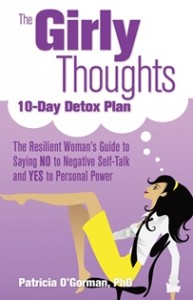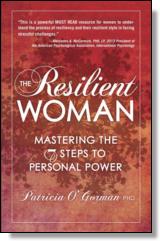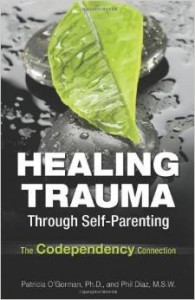By Patricia O’Gorman, PhD
Author of
 The Girly Thoughts 10-Day Detox Plan: The Resilient Woman’s Guide to Saying NO to Negative Self-Talk and YES to Personal Power (publication date 10.28.14)
The Girly Thoughts 10-Day Detox Plan: The Resilient Woman’s Guide to Saying NO to Negative Self-Talk and YES to Personal Power (publication date 10.28.14)

The Resilient Woman: Mastering the 7 Steps to Personal Power (2013)
 Healing Trauma Through Self-Parenting—The Codependency Connection (2012)
Healing Trauma Through Self-Parenting—The Codependency Connection (2012)
The recent public awareness of NFL player Adrian Peterson hitting his four-year son with a “switch” has begun a public dialogue of how appropriate it is to hit your child. But this conversation hasn’t reached everyone. Recently a parent told me he asked the local police if it was okay to hit his fifteen- year-old. The police allegedly told him it was okay if it was with an open hand.
Is Striking Your Child Ever Okay?
The next day I heard a caller on a radio show say that a switch is better than a hand because it is less likely to cause physical harm. Hmmm . . . this sounds to me like an issue of asserting power, maybe even venting some frustration, rather than actually teaching your child a lesson, all while you can be legitimately excused from taking responsibility if you go too far. As Adrian Peterson eloquently said, he should be not be seen as a “child abuser” because he didn’t mean to hurt his son.
This discussion of child abuse—for that is what the striking of a child is, whether with an open hand or a switch—made me think about the rule of thumb.
“Legal” Spousal Abuse
Rule of thumb is a term widely used today to refer to the standard way of doing something, but the origin of this term has a dark side. Rule of thumb once referred to the width of a stick you could use to hit your wife; it was recommended that it not be thicker than a man’s thumb. Yes, before we had the concept of domestic violence, it was a common practice to keep women in line by beating them. But not too hard. After all, they still had work to do.
Yes, it is shocking how common wife beating used to be. But has this changed? We recently saw Ray Rice caught on camera beating his wife and then proclaiming he is not a wife abuser because he loves his wife—implying that the two can’t go together.
What Does Have Love Have to Do with It?
“What’s Love Got to Do with It?” is a question singer/songwriter Tina Turner asked and answered. She is a woman who also knew about being beaten by a man she loved.
Tina Turner got out of her abusive relationship. But why do other women stay? Their girly thoughts tell them physical and emotional abuse are okay if he says:
- “Sorry.”
- “I love you.”
and best yet,
- “I didn’t mean it.”
Girly thoughts tell an abused wife or girlfriend not to make him so angry next time. They tell abused women that they are the cause of that anger, and that message fits in beautifully with him blaming you. Girly thoughts tell these victims to try to make everything nice, even when it isn’t.
If You’re In an Abusive Situation
- Don’t listen to your girly thoughts. Your girly thoughts tell you its okay to be hit and then blamed or apologized to.
- Contact your local domestic violence agency to get support and begin to plan what to do. Don’t know how to contact your local agency? Check your phone book or contact http://www.thehotline.org, which is currently experiencing a large number of women calling due to the recent publicity of how widespread domestic abuse is.
- If you’re concerned about whether the way your child was treated constitutes child abuse, call your local child abuse hotline (listed in information or your phone book). Check for symptoms of child abuse on http://www.childhelp.org/programs/entry/national-child-abuse-hotline/. They are the experts.
Don’t let your girly thoughts immobilize you. Get information. Take planned action.
Patricia A. O'Gorman, Ph.D., is a psychologist in private practice. She is noted for her work on women, trauma, and substance abuse and for her warm, inspiring, and amusing presentations that make complex issues accessible and even fun. She has served as a consultant to organizations across the country in preventative and clinical strategic planning. Dr. O'Gorman is a cofounder of the National Association for Children of Alcoholics, and she has held positions ranging from director of a rape crisis center to clinical director of a child welfare agency, and director of the division of prevention for the National Institute on Alcohol Abuse and Alcoholism (NIAAA). She is a veteran of numerous television appearances, including Good Morning America, Today, and AM Sunday and is the author of eight books including: The Girly Thoughts 10 Day Detox Plan (2014), The Resilient Woman: Mastering the 7 Steps to Personal Power (2013), and Healing Trauma Through Self-Parenting (2012) 12 Steps to Self-Parenting.

